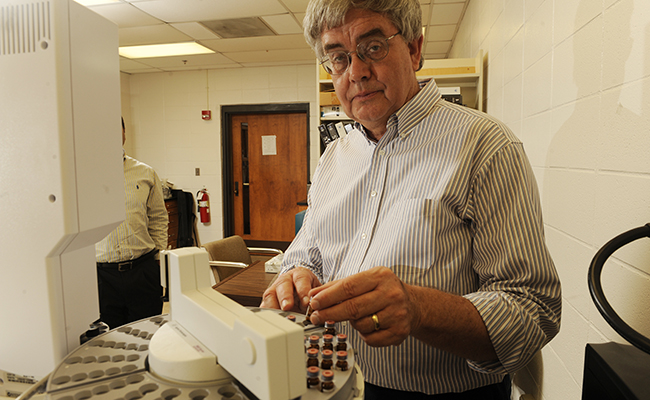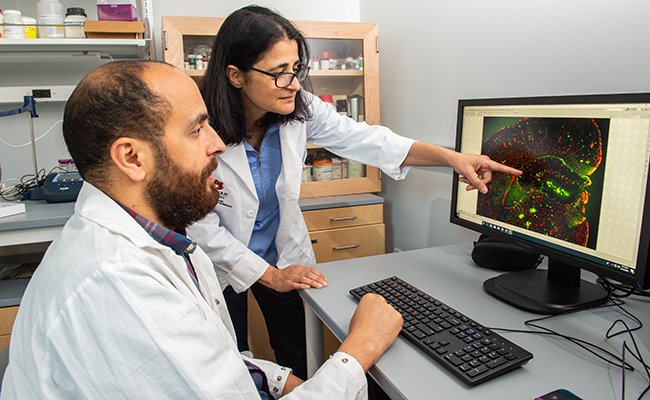
The Harrison College of Pharmacy offers M.S. and Ph.D. degrees in pharmaceutical sciences. Graduate students have the opportunity to conduct groundbreaking research while pursuing their degree under HCOP's outstanding faculty. During the application process, candidates will select one of four curricular options.
The Medicinal Chemistry, Pharmaceutics, and Pharmacology options are designed for students interested in the drug discovery or development processes, and are offered by the Department of Drug Discovery and Development. Most students interested in pursuing these options will identify a potential mentor and be admitted directly into the mentor’s lab.
Areas of interest include neurodegenerative diseases, cardiovascular diseases, infectious diseases, cancer, diabetes and other metabolic diseases, synthetic organic chemistry, forensic analytical chemistry, and drug delivery, disposition and formulation.
The Health Outcomes Research and Policy option is designed for students interested in the study of social and behavioral aspects of pharmacy, research to maximize medication-related outcomes, and comparative effectiveness research, and is offered by the Department of Health Outcomes Research and Policy. Areas of research interest include innovation adoption, comparative effectiveness, healthcare informatics, motivational interviewing, pharmacoepidemiology and drug safety, and socio-behavioral pharmacy.
For students currently enrolled in HSOP's Pharm.D. program, a dual-degree option exists that allows students to concurrently work toward a Ph.D. following the P1 year.
For more information, contact graduate program student services at hsopps@auburn.edu.
The Health Outcomes Research and Policy option focuses on studies of the social and behavioral aspects of pharmacy, research to maximize medication-related outcomes, and comparative effectiveness and safety research. This option is offered by the Department of Health Outcomes Research and Policy and students are not typically required to commit to a research mentor as a condition of admission to this graduate program option.

The Medicinal Chemistry option encompasses the design and synthesis of candidate drug molecules, in silico and high-throughput screens for candidate drug molecules, the isolation of bioactive molecules from complex plant or other natural materials, and the development and validation of techniques to detect drugs in bodily fluids. Thus, medicinal chemists frequently collaborate with scientists of other disciplines in studies of drug mechanism of action and drug biodistribution.
This program enables students to obtain training and to become credentialed in the field of medicinal chemistry. This field encompasses the study of drug mechanisms of action and biodisposition (absorption, distribution, metabolism and elimination), the design and synthesis of bioactive molecules, the detection and quantification of bioactive molecules, and the chemistry of natural products. Thus, the knowledge base and credentialing available through this program will enhance the ability of graduate students to obtain employment, particularly, but not exclusively, in the pharmaceutical industry. This program is being jointly administered by the Harrison School of Pharmacy and the Department of Chemistry and Biochemistry. Therefore, interested students and/or their faculty advisors should contact Prof. Jack DeRuiter (HCOP) or Prof. Stewart Schneller (Chemistry and Biochemistry) for more information.

The Pharmaceutics option encompasses studies of the physical and chemical stability of drugs and studies of drug kinetics, absorption, distribution, metabolism, and elimination. These studies are frequently pursued in the context of drug formulation, particularly the development of novel dosage forms.

The Pharmacology option encompasses studies of the mechanisms of human disease and candidate drug target identification and validation. This option also encompasses studies of the mechanism of action of drugs and drug candidates.

A limited number of graduate assistantships are available to students pursuing a graduate degree in pharmaceutical sciences. These assistantships are awarded on a competitive basis. Students will complete a Graduate Assistantship Interest Form at the time of application. Students with a qualifying assistantship will automatically receive a full graduate tuition waiver.
Auburn University offers a diverse, interdisciplinary environment for pursuing graduate study. Graduate students in the Harrison School of Pharmacy utilize shared research infrastructure in the Samuel Ginn College of Engineering, the College of Liberal Arts, the College of Sciences and Mathematics, the College of Veterinary Medicine, and the Auburn University Research Park.
These resources include supercomputing and e-data storage services; confocal, electron, and atomic force microscopes; mass spectrometry; research NMR; clinical and research MRI; DNA sequencing; peptide synthesis; transgenic mice; small animal imaging; and research animal care facilities. Our graduate students pursue collaborative research projects with investigators in virtually every academic unit at Auburn, including agriculture, business, engineering, human sciences, liberal arts, nursing, veterinary medicine, and sciences and mathematics. These studies are supported by approximately $125 million in extramural grants and contracts annually.
Auburn University offers a wealth of cultural and entertainment events, including live music, theater, museums, and college sports. Auburn, Ala., home of Auburn University, features a low cost of living, assorted housing options, outstanding public schools, and a wide array of dining and shopping opportunities.
Auburn University graduate students also benefit from close proximity to diverse shopping, dining, cultural, entertainment, and professional sports experiences in Atlanta, Birmingham, and Montgomery. Finally, Auburn University graduate students have easy access to a variety of outdoor activities, including camping, hiking, rock climbing, caving, hunting, fishing, boating, and kayaking.